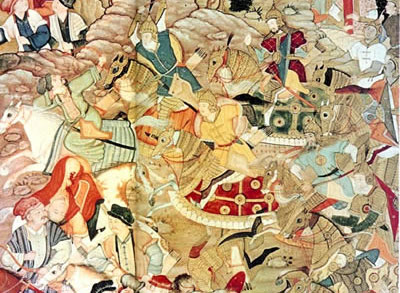
Illustration from History of the Moghuls, a 17th-century Indian text (detail), Gulestan Palace Library, Tehran
By 1260 these and other internal struggles over succession and leadership had led to a gradual breakdown of the Mongol Empire.
Because the basic organizing social unit for the Mongols was the tribe, it was very difficult to perceive a loyalty that went beyond the tribe. The result was fragmentation and division. And added to this was yet another problem: As the Mongols expanded into the sedentary world, some were influenced by sedentary cultural values and realized that, if the Mongols were to rule the territories that they had subjugated, they would need to adopt some of the institutions and practices of the sedentary groups. But other Mongols, traditionalists, opposed such concessions to the sedentary world and wanted to maintain traditional Mongolian pastoral-nomadic values. [More on the pastoral-nomadic life]
The result of these difficulties was that by 1260, the Mongol domains had been split into four discrete sectors.
One, ruled by Khubilai Khan, was composed of China, Mongolia, Korea, and Tibet [more on The Mongols in China]. The second segment was Central Asia. And from 1269 on, there would be conflict between these two parts of the Mongol domains.
The third segment in West Asia was known as the Ilkhanids. The Ilkhanids had been created as a result of the military exploits of Khubilai Khan's brother Hulegu, who had finally destroyed the Abbasid Dynasty in West Asia by occupying the city of Baghdad, the capital city of the Abbasids, in 1258.
And the fourth segment was the "Golden Horde" in Russia, which would oppose the Ilkhanids of Persia/West Asia in a conflict concerning trade routes and grazing rights in the area of contemporary Azerbaijan.
Still, despite all these fissures within the Mongol empire and the various sections of its domains, the reign of the Mongols would still help to usher in the beginnings of what could be called a "global" history.
"The Mongols: Ecological and Social Perspectives," by Joseph Fletcher, in Harvard Journal of Asiatic Studies 46/1 (June 1986): 11-50.